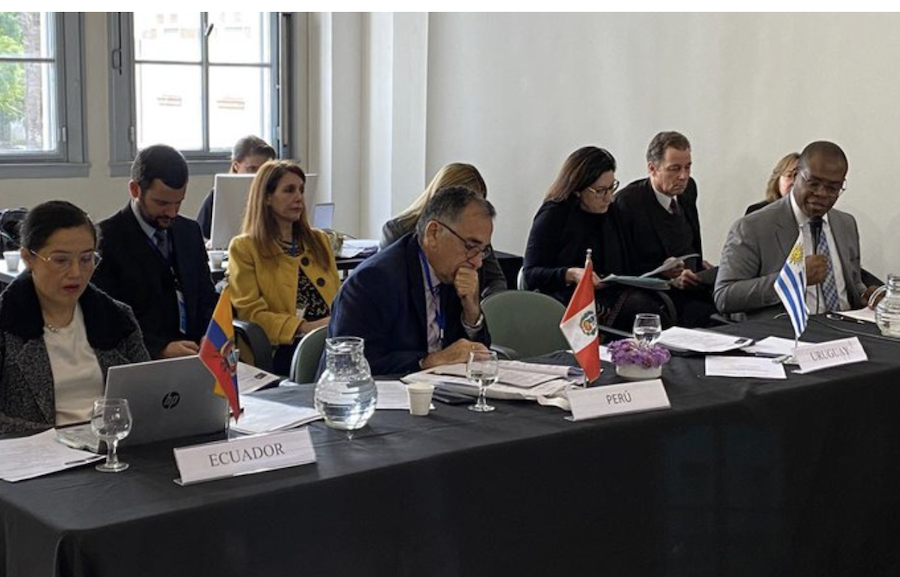. TOLERANCE & SOLIDARITY .
An article from the government of Brazil (translation by CPNN)
Alongside representatives of other Mercosur countries, the Minister of Human Rights and Citizenship, Silvio Almeida, signed this Friday (May 12), the “Declaration for a Culture of Peace and Democracy and for Combating Expressions and Hate Speech”. The document, written during the plenary of the 41st Meeting of High Authorities on Human Rights of Mercosur (RAADH), in Buenos Aires, shows the position of the bloc’s countries on this issue.

Minister Silvio Almeida represented Brazil during the RAADH meeting in Buenos Aires, Argentina. (Photo: Isabel Carvalho – Ascom/MDHC)
During the discussions at the Plenary of High Authorities, the minister took a strong position against the use ;of hate speech. “Fascists have no political opinion they have hatred. As the state, we have the duty to fight any and all hate speech and to act without borders against fascists and Nazis”, he said.
The text of the declaration condemns the circulation of hate speech and expressions of racism, xenophobia and all forms of oppression. It also condemns manifestations posted on social networks and media that intentionally attack people and groups in vulnerable situations and those historically discriminated against.
The senior authorities addressed, during the plenary session, the theme of Human Rights and the exercise of Citizenship. The Brazilian delegation reiterated the country’s commitment to policies for the protection and promotion of the elderly, highlighting the urgency of the need for specific human rights policies for this population, including inclusion processes. In addition, data on the aging of the population in Brazil and in the region were presented, highlighting that the elderly still suffer violations of rights and age discrimination.
(Click here for the original Portuguese version of this article)
(continued in right column)
Are we making progress against racism and hate speech?
(continued from left column)
Work group
The declaration also agreed on the creation of a working group (GT) to create a series of guidelines to be used internally by the signatory countries. The guidelines aim to guarantee the protection and promotion of the human rights of the people who inhabit their territories through prevention and treatment actions to face all other forms of discrimination, as well as to promote all types of subsequent accountability.
“Latin America has a history of political instability and attacks on sovereignty and disrespect for human rights. It is important that we take a stand in defense of democracy and institutional stability, combating all kinds of threats”, said the minister.
Brazil’s participation in the event marks the country’s return to discussions on the human rights agenda in Latin America, after four years of absence.
Debates
The 41st RAADH took place throughout the week and, at the end, the authorities presented in the plenary a compilation of information from the thematic meetings with the suggestions they consider important to be adopted by all the countries of the Mercosur bloc.
Among the topics discussed by Brazil are issues related to children and adolescents, women’s rights, people with disabilities, the elderly, education and culture, communication, social participation, memory, truth and justice, and social equality.
Symbolism
The place chosen to host the Plenary of High Authorities on Human Rights had a special symbolism. It was held at the Sitio de Memoria ESMA, a former torture and extermination center that today serves as a memorial site for the atrocities committed against the victims of the last military coup in Argentina (1976 to 1983). The holding of the 41st RAADH in such an emblematic place was highlighted by the participants of the event and was included in the Final Act of the Plenary.
In addition to Minister Silvio Almeida, representing Brazil, the Plenary was attended by Horacio Pietragalla, Secretary of Human Rights of Argentina; Silvia Patiño Santacruz, Deputy Minister of Justice of Paraguay; Tomas Ignacio Pascual Ricke, Director of Human Rights at the Ministry of Foreign Affairs of Chile; and Carlos Alberto Chocano Burga, Ambassador of Peru to Argentina.
Next RAADH
The Meeting of High Authorities on Human Rights of Mercosur (RAADH) takes place every six months and is responsible for reflecting on and dictating the bloc’s human rights agenda.
The 42nd edition of the event will take place next semester in Brazil, when the country will exercise the Pro Tempore presidency of Mercosur and will host the bloc’s discussions.